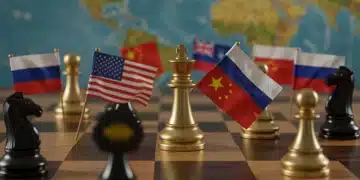US-Foreign Nation Diplomatic Tensions: International Impact

The escalating diplomatic tensions rise between US and a foreign nation, significantly impacting international relations by altering alliances, trade dynamics, and global security frameworks.
The intricate web of global politics is perpetually shifting, and few developments command as much attention as when diplomatic tensions rise between US and a foreign nation: impact on international relations. Such friction isn’t merely a headline; it’s a dynamic force with the power to reshape alliances, redefine trade partnerships, and alter the delicate balance of global security.
The origins of heightened diplomatic tensions
Understanding the roots of diplomatic friction between major powers like the United States and a foreign nation is crucial for grasping their broader implications. These tensions seldom erupt overnight; rather, they are often the culmination of a series of events, misunderstandings, and strategic divergences that build over time. Historically, such escalations have stemmed from diverse factors, ranging from economic disputes to ideological clashes.
One common catalyst is a divergence in national interests, particularly when these interests intersect in regions of strategic importance. For example, competition over natural resources, influence in developing nations, or access to critical trade routes can sow seeds of discord. Each nation, driven by its own sovereignty and domestic imperatives, may pursue policies that are perceived as antagonistic by the other, inadvertently setting the stage for diplomatic strain.
Economic competition and trade disputes
Economic rivalry frequently underpins diplomatic tensions. As nations strive for global economic dominance, disputes over trade imbalances, intellectual property rights, and market access become flashpoints. The imposition of tariffs, sanctions, or export controls can be seen as acts of economic aggression, provoking retaliatory measures and escalating the cycle of mistrust.
- Trade imbalances: Persistent deficits or surpluses can lead to accusations of unfair trade practices.
- Intellectual property theft: Allegations of widespread intellectual property theft often fuel accusations of economic espionage and undermine trust.
- Market access barriers: Restrictions on foreign companies entering domestic markets can be perceived as protectionist and discriminatory.
- Sanctions and export controls: These tools, often used to exert political pressure, can severely disrupt bilateral economic ties.
Beyond direct economic measures, nations may also engage in currency manipulation or subsidize their industries, creating an uneven playing field in the global marketplace. These actions, even if framed as internal economic policies, can have significant external ramifications, forcing other nations to respond and contributing to a deteriorating diplomatic environment.
Ideological differences and human rights concerns
Deep-seated ideological differences can serve as profound sources of diplomatic tension. Nations founded on democratic principles often clash with those operating under authoritarian or socialist systems, particularly concerning issues of governance, human rights, and individual freedoms. These differences are not merely philosophical; they translate into tangible disagreements over internal affairs and international norms.
Concerns over human rights abuses, suppression of dissent, or systemic discrimination within a foreign nation’s borders can prompt strong condemnation from the United States, often leading to diplomatic rebukes or calls for international intervention. Such criticisms are frequently viewed as interference in sovereign affairs, further inflaming tensions and making constructive dialogue more challenging. The very act of raising these issues, while principled, can create substantial diplomatic hurdles.
Ultimately, the genesis of heightened diplomatic tensions is multifaceted, involving a complex interplay of economic, strategic, and ideological factors. Unraveling these origins is the first step toward understanding the profound impact such tensions have on the broader landscape of international relations.
Shifting alliances and geopolitical realignments
When diplomatic relations between the United States and a foreign nation become strained, the ripple effects extend far beyond the immediate bilateral relationship. One of the most significant consequences is the potential for shifting alliances and broader geopolitical realignments. Nations around the globe, often caught between competing powerful interests, are compelled to re-evaluate their strategic positions, economic partnerships, and security postures.
Third-party nations may find themselves in a difficult bind, pressured to choose sides or navigate a delicate balance between conflicting loyalties. This can lead to a fragmentation of existing blocs or the formation of new alliances, fundamentally redrawing the world’s geopolitical map. Historically, such periods of heightened tension have often preceded significant international policy shifts, as countries adapt to a new diplomatic reality.
The erosion of multilateral institutions
A troubling byproduct of escalating diplomatic tensions is the potential erosion of multilateral institutions. Organizations like the United Nations, the World Trade Organization, and various regional bodies rely on cooperation and consensus among member states to function effectively. When two major powers are at odds, their disagreements can paralyze these institutions, making it difficult to address pressing global challenges.
- Veto power stalemates: Security Council resolutions at the UN can be blocked by conflicting interests.
- Trade dispute paralysis: The WTO’s ability to mediate disputes is hampered by a lack of willingness to compromise.
- Environmental cooperation setbacks: Global efforts to combat climate change or preserve biodiversity can falter without broad international consensus.
- Humanitarian aid complications: Delivery of aid can become politicized or face logistical hurdles due to strained diplomatic ties.
The weakening of these institutions means a diminished capacity for collective problem-solving. Issues such as climate change, pandemics, and nuclear proliferation require a unified international response; profound diplomatic rifts make such unity increasingly elusive. Nations may resort to unilateral actions, further exacerbating instability and distrust, rather than seeking multilateral solutions.
Emergence of new strategic partnerships
Conversely, increased diplomatic tensions can also spur the emergence of new strategic partnerships. Nations that feel marginalized or threatened by the escalating conflict may seek to strengthen ties with others who share similar concerns or strategic goals. This can manifest in various forms, from enhanced military cooperation and intelligence sharing to new economic agreements and cultural exchanges.
These new partnerships are not always explicitly anti-US or anti-foreign nation; often, they are simply an adaptation to a changed geopolitical landscape, driven by a pragmatic assessment of national security and economic interests. However, their formation can inevitably alter the global power balance, presenting new challenges and opportunities for all involved parties. The fluidity of contemporary international relations demands constant vigilance and adaptation from all actors.
Ultimately, the shifting sands of alliances and the potential for geopolitical realignments are a testament to the profound impact that escalating diplomatic tensions can have far beyond the bilateral relationship, influencing the very structure of the global order.
Economic repercussions and global trade
When diplomatic tensions rise between the United States and a foreign nation, the economic sphere is often one of the first and most significantly impacted areas. The intricate web of global trade and finance means that economic repercussions are rarely contained to just two countries; they can reverberate throughout the world, affecting supply chains, investment flows, and commodity markets. Businesses and consumers alike can feel the pinch as uncertainty grows.
One immediate consequence is usually a disruption in bilateral trade. Tariffs, sanctions, and other trade barriers can lead to increased costs for imports, reduced demand for exports, and a general dampening of economic activity. Companies reliant on stable cross-border trade are forced to re-evaluate their strategies, potentially seeking new markets or suppliers, which can be both costly and time-consuming.
Disruption of global supply chains
Modern global supply chains are highly integrated and often span multiple countries. Diplomatic tensions introduce significant risks to these networks, as businesses fear disruptions in the flow of goods, raw materials, and components. Tariffs, export controls, or even political pressure can impede the movement of critical supplies, leading to production delays, increased costs, and ultimately, higher prices for consumers.
Companies may respond by attempting to “de-risk” their supply chains through diversification or by bringing production closer to home (reshoring). While this can enhance resilience in the long run, the immediate transition is often expensive and inefficient, causing further economic friction. The pharmaceutical, technology, and automotive sectors are particularly vulnerable due to their complex and globally dispersed production processes.
Impact on investment and financial markets
Uncertainty stemming from diplomatic tensions also dampens investor confidence. Foreign direct investment (FDI) into the involved nations may decline as investors perceive increased political risk. This can lead to a slowdown in economic growth, job losses, and a reduced capacity for innovation. Capital markets can also become turbulent, experiencing increased volatility and unpredictable movements.
- Decreased FDI: Investors become more cautious, postponing or canceling new projects.
- Currency fluctuations: Exchange rates can become highly volatile as capital flows in and out of affected economies.
- Stock market instability: Indices can dip in response to negative geopolitical news, affecting investor portfolios.
- Commodity price shifts: Prices of key commodities like oil or rare metals can be influenced by fears of supply disruptions.
Such economic instability creates a challenging environment for businesses to plan and grow. Smaller economies, disproportionately reliant on trade with the tension-ridden nations, may find themselves particularly vulnerable to economic contagion. The interconnectedness of the global financial system means that even seemingly localized diplomatic spats can have broad and unpredictable financial consequences.
In essence, the economic repercussions of heightened diplomatic tensions are far-reaching and complex, impacting not just the directly involved nations but the entire global economy through disrupted trade, jeopardized supply chains, and nervous financial markets. These economic challenges often compel nations to seek de-escalation, given the high price of prolonged disputes.

Security implications and regional stability
Beyond economics and alliances, the escalating diplomatic tensions rise between US and a foreign nation: impact on international relations profoundly affects global security and regional stability. When dialogue falters and mistrust grows, the risk of miscalculation increases, potentially leading to unintended military escalations or proxy conflicts. This creates a volatile environment where existing regional disputes can intensify, and new flashpoints may emerge.
The security landscape becomes more precarious as nations engaged in diplomatic disputes may bolster their military presence, engage in tit-for-tat military exercises, or increase surveillance activities. Such actions, intended as deterrents or shows of strength, can easily be misinterpreted by the other side, leading to a dangerous cycle of escalation where each action prompts a counter-action, escalating the potential for direct confrontation.
Arms race and military build-up
One significant security implication is the potential for an accelerated arms race and military build-up. As diplomatic channels become less effective, nations may resort to military strength as a primary means of projecting power and ensuring their security. This can involve increased defense spending, the development of new weapon systems, and the modernization of armed forces.
- Increased defense budgets: Resources are diverted from social programs or economic development to military expansion.
- Development of advanced weaponry: Focus on missile technology, cyber warfare capabilities, and naval expansion.
- Military exercises: More frequent and larger-scale drills can be perceived as provocative by rivals.
- Nuclear proliferation concerns: Tensions can undermine non-proliferation efforts, pushing more nations to seek nuclear deterrence.
The proliferation of sophisticated weaponry and the heightened military presence increase the potential for conflict, even accidental ones. A region already susceptible to instability can become a tinderbox, where minor incidents could quickly spiral out of control. This can also lead to a dangerous arms race dynamic where third-party nations feel compelled to acquire more advanced military capabilities to maintain their own security posture, creating a global ripple effect.
Cyber warfare and hybrid threats
In the 21st century, security implications extend beyond traditional military engagements to include cyber warfare and hybrid threats. Diplomatic tensions often coincide with an increase in state-sponsored cyberattacks targeting critical infrastructure, government networks, or sensitive data. These attacks can cripple essential services, disrupt economies, and sow widespread disinformation.
Furthermore, hybrid threats, which blend conventional and unconventional tactics, can emerge. This includes the use of proxies, propaganda, economic coercion, and information warfare to undermine an adversary’s stability without direct military confrontation. The attribution of such attacks can be difficult, further complicating diplomatic responses and making de-escalation exceedingly challenging. These modern forms of aggression add layers of complexity to managing international security in an era of heightened diplomatic friction.
Therefore, security implications, spanning from the risk of conventional military conflict to new form of warfare, are a paramount concern when diplomatic tensions rise. Maintaining regional and global stability requires not only de-escalation of immediate crises but also long-term strategies to build trust and mitigate the underlying drivers of conflict.
The role of diplomacy and negotiation
Despite the severe implications of heightened diplomatic tensions rise between US and a foreign nation: impact on international relations, the critical role of diplomacy and negotiation cannot be overstated. When relations sour, these channels become even more vital, serving as the primary mechanisms through which nations can de-escalate crises, manage disagreements, and seek common ground. Effective diplomacy aims to prevent miscalculation, bridge divides, and lay the groundwork for a more stable future, even when facing significant obstacles.
Maintaining open lines of communication, even if informal or through third parties, is paramount. This allows for direct messaging, clarification of intentions, and the exploration of potential compromises. Without such dialogue, misunderstandings can fester, and each side may attribute malicious intent to the other, making resolution increasingly distant. The very act of engaging in diplomatic discussions, regardless of immediate success, can signal a willingness to find a peaceful way forward.
Back-channel communications and intermediaries
When formal diplomatic channels are strained or have broken down, back-channel communications often become crucial. These informal, discreet exchanges, sometimes facilitated by neutral intermediaries or trusted allies, can provide a space for candid discussions away from public scrutiny. They allow for the exploration of sensitive topics or potential concessions without the pressure of public posturing.
Intermediaries play a particularly valuable role by conveying messages, clarifying positions, and probing for areas of flexibility. Their objectivity can help build trust and present options that might be dismissed if proposed directly by one of the disputing parties. Historical examples abound where back-channel diplomacy proved instrumental in preventing conflicts or achieving breakthroughs in seemingly intractable disputes between nations.
Confidence-building measures (CBMs)
To reduce mistrust and foster an environment conducive to negotiation, nations often employ Confidence-Building Measures (CBMs). These are actions taken by one or both sides to demonstrate their peaceful intentions and reduce the risk of accidental conflict. CBMs can range from military transparency initiatives to joint cultural programs, each designed to lower the temperature and build a degree of trust.
- Military transparency: Sharing information on troop movements, military exercises, or weapon inventories.
- Joint economic projects: Collaborations that foster mutual dependence and shared benefit.
- Cultural and educational exchanges: Programs that promote understanding and collaboration at a societal level.
- Crisis hotlines: Direct communication links to prevent misinterpretations during emergencies.
While CBMs may not resolve the core issues of diplomatic tension, they create a more stable foundation upon which formal negotiations can proceed. They signal a commitment to de-escalation and demonstrate a willingness to engage constructively. The sustained implementation of CBMs can gradually transform an adversarial relationship into one characterized by greater predictability and, eventually, cooperation.
In essence, in an era of rising tensions, the strategic application of diplomacy, coupled with the creative use of back channels and CBMs, stands as the most effective path toward de-escalation. It underscores the belief that even the most formidable international challenges can be mitigated through persistent and purposeful engagement.
The long-term implications for global governance
The escalating diplomatic tensions rise between US and a foreign nation: impact on international relations carry profound long-term implications for the very architecture of global governance. The existing international system, built on principles of cooperation, multilateralism, and international law, faces immense pressure when major powers are at loggerheads. The cohesion and effectiveness of global institutions are tested, and the future of international norms and frameworks becomes uncertain.
One significant long-term consequence is the potential for a more fractured and less cohesive international order. If major powers continue to prioritize unilateral actions or align themselves strictly along ideological lines, the ability to address shared global challenges effectively diminishes. Issues such as climate change, pandemics, nuclear proliferation, and economic stability require concerted global action, which becomes exceedingly difficult in a climate of high diplomatic tension and mistrust.
Challenges to international law and norms
Heightened diplomatic tensions can lead to challenges to established international law and norms. Nations may selectively adhere to legal frameworks or withdraw from treaties if they perceive them as infringing on their sovereign interests or as being wielded to their disadvantage by rivals. This erosion of adherence to international law can create a dangerous precedent, undermining the very foundation of predictable and rules-based international relations.
When powerful nations disregard international legal principles, it can incentivize other, smaller states to do the same, leading to a cascade effect where the rule of law in international affairs is progressively weakened. This can make conflict resolution more challenging, as there is less shared understanding of permissible conduct or established mechanisms for dispute settlement.
Reshaping the global power balance
Ultimately, a prolonged period of diplomatic tension and competition between major powers can lead to a fundamental reshaping of the global power balance. New power centers may emerge, and existing hegemonies could be challenged or diminished. This is not necessarily a sudden shift but a gradual evolution, influenced by economic growth, military capabilities, and the ability of nations to attract allies and influence international discourse.
- Rise of multipolarity: A shift from a unipolar or bipolar world to one with multiple major powers.
- Regional power consolidation: Emerging regional blocs gain more influence on the global stage.
- Decline of traditional alliances: Old alliances may fray as nations seek new strategic partnerships.
- Increased competition for influence: Nations vie for leadership in international organizations, technology, and economic spheres.
This reshaping of the global power balance has implications for every aspect of international relations, from economic policy and trade agreements to security arrangements and cultural diplomacy. The long-term trajectory of global governance depends heavily on how these tensions are managed and whether major powers can eventually find ways to coexist and cooperate, even amidst their differences.
In conclusion, the long-term implications of rising diplomatic tensions extend to the very foundations of global governance. They pose a significant test to established international norms and have the potential to permanently alter the global distribution of power. The response to these challenges will define the character of international relations for decades to come.

Navigating public perception and domestic politics
The complex dance of international diplomacy is never solely about state-to-state interactions; it is heavily influenced by, and in turn influences, public perception and domestic politics within the nations involved. When diplomatic tensions rise between US and a foreign nation: impact on international relations, leaders often find themselves walking a tightrope, balancing external pressures with internal demands. Public opinion, shaped by media narratives and cultural biases, can either constrain or empower foreign policy decisions.
Government leaders must constantly consider how their actions will be perceived by their own populace. This can lead to a more assertive (or, conversely, a more cautious) stance in international negotiations, driven by a desire to appear strong, protect national interests, or maintain domestic political support. The interweaving of foreign policy and domestic politics means that diplomatic solutions are not always just about international compromise; they also require domestic consensus, which can be elusive.
The role of media and information warfare
In an era of instant information and pervasive social media, the media plays a pivotal role in shaping public perception during diplomatic tensions. News coverage, both traditional and digital, can frame narratives, highlight specific aspects of a dispute, and influence public sentiment. This can be a double-edged sword: responsible journalism can inform and educate, while biased or sensationalist reporting can inflame passions and deepen existing divides.
- Narrative control: Governments attempt to control the messaging around international disputes.
- Disinformation campaigns: State and non-state actors may spread false or misleading information to influence public opinion.
- Censorship: Governments might restrict access to certain foreign media outlets to control domestic narratives.
- Echo chambers: Social media algorithms can reinforce existing biases, making it harder for balanced perspectives to emerge.
Beyond traditional media, information warfare—including the strategic dissemination of propaganda and disinformation—becomes a significant tool in times of heightened tension. Both nations may engage in efforts to discredit the other, sway public opinion, and garner international sympathy for their respective positions. This digital battle for hearts and minds further complicates diplomatic efforts, as trust becomes a scarce commodity in the information ecosystem.
Domestic political pressures and electoral cycles
Domestic political pressures, particularly those related to electoral cycles, can heavily influence how leaders manage diplomatic tensions. Politicians approaching re-election may feel compelled to adopt a tougher stance against a perceived adversary to appeal to nationalist sentiments or a skeptical electorate. Conversely, a leader facing domestic economic challenges might seek to de-escalate tensions to avoid further economic disruption.
Lobby groups, business interests, and public advocacy organizations also exert pressure, advocating for policies that align with their specific agendas. This internal tug-of-war can make it difficult for foreign policy decision-makers to pursue optimal diplomatic strategies, as they must continuously weigh international imperatives against domestic political realities. Navigating this labyrinth requires shrewd political acumen and a deep understanding of both national and international dynamics.
In summary, public perception and domestic politics are not mere footnotes in the saga of diplomatic tensions; they are integral forces that shape foreign policy decisions, influence the effectiveness of diplomatic outreach, and ultimately determine both the nature and longevity of international disputes. Addressing these internal factors is as crucial as managing external pressures.
| Key Aspect | Brief Impact |
|---|---|
| 🌍 Geopolitical Shifts | Redrawing alliances and influencing global power dynamics. |
| 💰 Economic Volatility | Disruptions in trade, supply chains, and investment. |
| 🛡️ Security Risks | Increased military build-up and potential for conflict. |
| 🗣️ Role of Diplomacy | Crucial for de-escalation and maintaining communication channels. |
Frequently Asked Questions About Diplomatic Tensions
Diplomatic tensions commonly arise from a mix of factors, including economic disputes, such as trade imbalances or intellectual property theft, and divergences in national interests or ideological beliefs. Human rights concerns, competition over strategic resources, or historical grievances can also significantly contribute to the strained relations between countries.
Diplomatic tensions often lead to disruptions in global trade through measures like tariffs, sanctions, and export controls. These actions can increase import costs, reduce export demand, and generally slow down economic activity. Furthermore, they can jeopardize global supply chains, leading to higher production costs and consumer prices, directly impacting international commerce.
While diplomatic tensions do not automatically lead to military conflict, they significantly increase the risk of miscalculation and unintended escalation. Heightened rhetoric, military build-ups, and the erosion of trust can create a volatile environment where minor incidents could escalate rapidly. However, strong diplomatic channels and de-escalation efforts aim to prevent such outcomes.
Multilateral institutions like the United Nations play a crucial role by providing platforms for dialogue, mediation, and dispute resolution. They encourage adherence to international law and norms, fostering cooperation to address shared challenges. However, their effectiveness can be hampered if major powers use their influence to block consensus or leverage the institutions for their own strategic gains amidst tensions.
Public opinion can exert significant pressure on leaders, influencing foreign policy decisions during diplomatic tensions. Media narratives and social media can shape public sentiment, potentially driving leaders to adopt more assertive stances to appear strong or to satisfy nationalist sentiments. Conversely, a public desire for peace might push leaders towards de-escalation; thus, domestic politics plays a key role.
Conclusion
The rise in diplomatic tensions between the US and a foreign nation stands as a stark reminder of the volatile and dynamic nature of international relations. From reshaping geopolitical alliances and disrupting global trade to escalating security risks and casting shadows over multilateral governance, the consequences are far-reaching. While economic and security implications are immediate and tangible, the underlying ideological differences and domestic political pressures often fuel these protracted disputes. Nevertheless, the enduring importance of diplomacy, negotiation, and confidence-building measures remains paramount. As the world navigates these intricate challenges, the ability to maintain open channels of communication and find common ground will be critical in mitigating further escalation and preserving the fragile balance of global stability, ensuring that differences can be managed without devolving into broader conflict.





